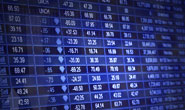China eclipses U.S. as top IPO venue
 China has again outshone the United States as the top venue for initial public offerings despite steep share price falls on the mainland and Hong Kong stock markets, highlighting the shift in global financial activity from west to east.
China has again outshone the United States as the top venue for initial public offerings despite steep share price falls on the mainland and Hong Kong stock markets, highlighting the shift in global financial activity from west to east.Companies raised $73-billion (U.S.) from IPOs in Shanghai, Shenzhen and Hong Kong this year, according to Dealogic – almost double the amount of money raised on the New York Stock Exchange (NYA-I8,338.76—-%) and Nasdaq (COMP-I2,643.5238.371.47%) combined.
Hong Kong retained its crown as the top bourse for the third year in a row, with $30.9- billion raised this year. That figure compares with $30.7-billion and $18-billion, respectively, on the New York and London stock exchanges.
The results belied much weaker deal flow on mainland and Hong Kong exchanges this year, as market turmoil forced companies to delay share offerings and, in some cases, call them off at the last minute. The $73-billion they raised was less than half last year’s total, compared with a 6 per cent decline in IPO fundraising on US exchanges.
The U.S. last topped the IPO league tables in 2008.
Hong Kong’s benchmark Hang Seng index (HK-I18,877.41443.022.40%) is also down nearly 20 per cent this year and China’s main index in Shanghai has fallen 23 per cent, making Chinese markets among the worst performing in the world. U.S. stock markets are ending a volatile year where they began, with the Standard & Poor’s 500 index (SPX-I1,276.0418.441.47%) down less than 1 per cent as of Wednesday.
Until recently, Hong Kong rarely attracted listings by companies outside of China. But with western markets in a funk and the euro zone gripped by a sovereign debt crisis, the bourse has recently hosted a number of landmark IPOs by foreign groups including Prada, Glencore and Samsonite.
“The pipeline of deals is still very heavy in Hong Kong,” said Philippe Espinasse, author of IPO: A Global Guide. “A lot of deals were delayed or failed to launch this year, which means next year should be fairly busy as long as we get a breather on the macro front.”
Companies raised more than $41-billion in Shenzhen and Shanghai, even as stock prices tumbled to three-year lows.
Chi-Next, a Shenzhen-based exchange for start-ups that is meant to be China’s answer to Nasdaq, raised almost $11-billion in total. That compares with about $15-billion raised in Shenzhen and $16-billion in Shanghai.
Foreign investment banks have, however, failed to capitalize on the mainland capital-raising boom. Goldman Sachs (GS-N95.825.395.96%), the world’s leading equity book runner by volume, has not underwritten a single IPO on the mainland since 2009.
Foreign investment banks are also under pressure in Hong Kong. Chinese securities firms have fought hard to win market share from their Wall Street rivals, pushing down overall fee levels as a result.
Chinese banks captured a combined 30 per cent of the Hong Kong IPO market this year, the most since 2006, according to Bloomberg. The average commission for underwriters in Hong Kong was just 2.2 per cent of an IPO’s proceeds compared with 3.5 per cent a decade ago.
You can return to the main Market News page, or press the Back button on your browser.

